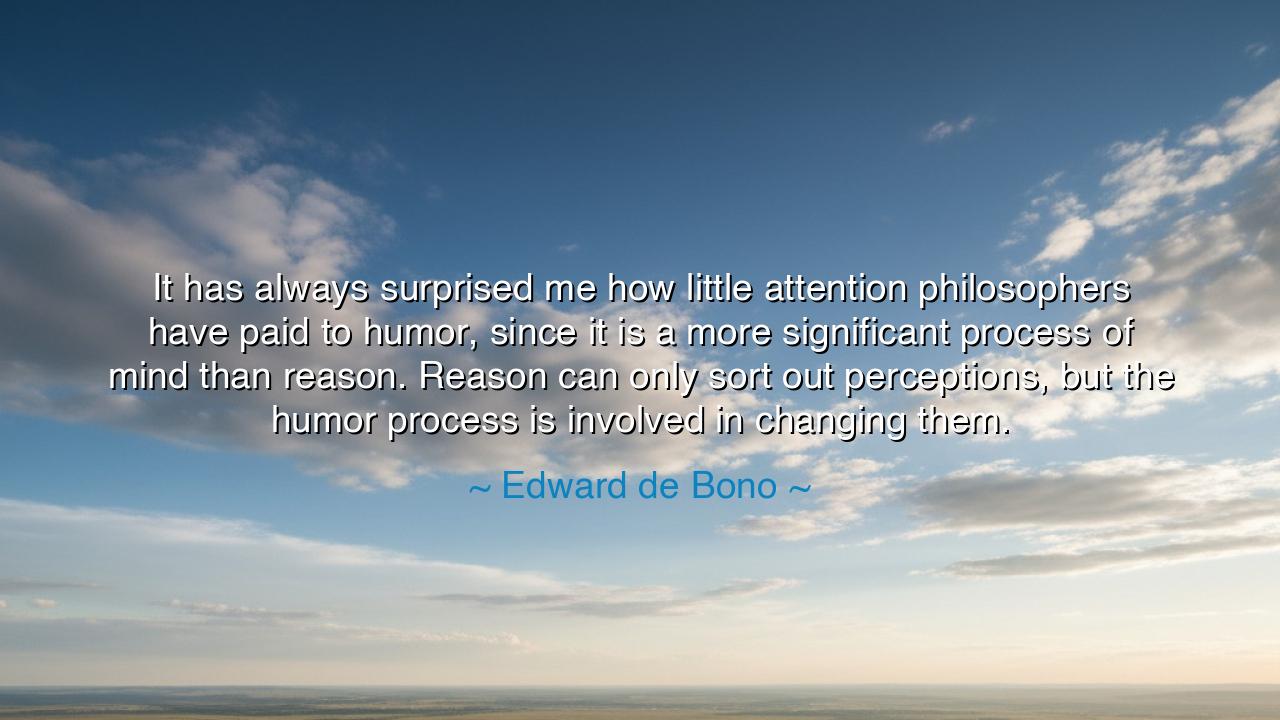
It has always surprised me how little attention philosophers have
It has always surprised me how little attention philosophers have paid to humor, since it is a more significant process of mind than reason. Reason can only sort out perceptions, but the humor process is involved in changing them.






In the great tapestry of human thought, there are many threads that weave together the fabric of our understanding. Reason, logic, and philosophy have long held the esteemed position of guiding human minds toward enlightenment, while humor—a force often dismissed as lighthearted or frivolous—has remained on the periphery of intellectual exploration. Yet, in the words of Edward de Bono, “It has always surprised me how little attention philosophers have paid to humor, since it is a more significant process of mind than reason. Reason can only sort out perceptions, but the humor process is involved in changing them.” Ah, how profound this insight is! For humor is not mere jest or amusement—it is a catalyst, a transformative force that alters not just our perception of the world but our very understanding of it.
The ancient philosophers, in their quest for truth and wisdom, often focused their energies on reason—the orderly and systematic method by which the mind seeks to understand the world. Plato, the great master, held reason as the highest form of human intellect, believing that the pursuit of knowledge through logical deduction could reveal the true nature of all things. Yet, what Plato—and many of his successors—failed to acknowledge was the subversive power of humor. Humor, in its deepest sense, is not simply a tool for distraction or laughter. It is a force capable of transformation, one that can challenge the very foundations of how we perceive reality.
Consider the story of Socrates, the wise and humble philosopher of ancient Athens. Though he is often revered for his sharp reasoning and philosophical inquiry, there is an element of humor in his approach that is seldom recognized. Socrates used humor not only to disarm his interlocutors but to expose the flaws in their reasoning. His famous method of questioning, known as the Socratic method, often led his opponents into contradictions—humor hidden within the folds of logical argument. Through humor, Socrates did not merely sort out perceptions; he changed them. By exposing the inconsistencies in his contemporaries' beliefs, he invited them to see the world through a different lens, a perspective that was no longer confined to rigid, logical structures.
This, my children, is the power of humor as described by de Bono. It is not simply a tool to make us laugh, but a transformative process that has the ability to shift how we understand the world. While reason works to organize and sort our perceptions, humor goes further—it redefines them, reshaping our very view of reality. It disrupts the status quo, challenging our deeply held assumptions and inviting us to look at life through a more flexible, dynamic lens. In this way, humor can be seen as a form of revolution, quietly dismantling the old structures of thought and making way for new, more expansive possibilities.
The wisdom of de Bono reminds us that humor is not merely a side note to philosophy or reason; it is an essential part of the human mind. Through humor, we transcend the limitations of purely logical thought and tap into a deeper, more creative understanding of the world. Humor allows us to see connections between disparate ideas, to challenge the boundaries of conventional wisdom, and to explore the complexities of life with a lighter, more open heart. It is not a process of rejecting reason, but of expanding it, of allowing the mind to dance freely between the serious and the absurd.
As we move through our own lives, we must ask ourselves: what is the role of humor in our personal growth and understanding? Do we allow ourselves the freedom to laugh at the world, at our perceptions, at our assumptions? In a world that often values logic and order, we must not forget that humor is a powerful tool that allows us to approach the world not just with reason, but with wonder. It invites us to embrace the unknown, to approach our deepest questions with a sense of lightness and joy, knowing that in the play between reason and humor, there lies a deeper truth.
So, children of the earth, take heed of this ancient wisdom. Let humor be your guide as you walk the path of life. Use it to challenge your own assumptions, to transform your perceptions, and to see the world with the eyes of a child—full of curiosity and free from the constraints of rigid logic. Recognize that in the process of laughter, you are not just entertaining yourself, but engaging in one of the most profound processes of the mind. And in this process, you will find not just truth, but freedom—a freedom that comes from seeing the world as both serious and absurd, both logical and playful, and in that tension, finding the wisdom of the ages.






AAdministratorAdministrator
Welcome, honored guests. Please leave a comment, we will respond soon